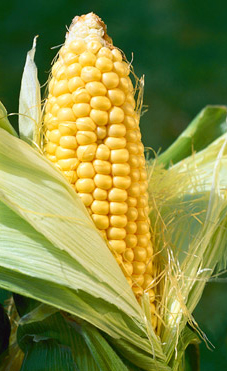|
ESL Forum:
Techniques and methods
in Language Teaching
Games, activities
and teaching ideas
Grammar and
Linguistics
Teaching material
Concerning
worksheets
Concerning
powerpoints
Concerning online
exercises
Make suggestions,
report errors
Ask for help
Message board
|
ESL forum >
Grammar and Linguistics > In doubt
In doubt
|

carinita

|
In doubt
|
 a corn a corn
some corn seeds
Not sure "a" corn is possible
Thanks |
8 Mar 2011
|
|
|
|

Mallerenga

|
|
I would say a corn cob if you refer to "mazorca" or some corn (as it is uncountable) to refer to the seeds.
|
8 Mar 2011
|
|
|

brookee

|
|
The term "kernels of corn" refers to the individual pieces.
An "ear of corn" refers to the item as a whole.
~~Brooke |
8 Mar 2011
|
|
|

ballycastle1

|
|
I �m used to �corn on the cob � as in �Would you like corn on the cob with that? � I haven �t heard an article used with it - it �s just presumed that you �re talking about one (unless you �re absolutely ravenous).
Maybe it �s used differently elsewhere. |
9 Mar 2011
|
|
|

jrg2

|
|
"A cob of corn."
That �s how it �s used where I �m from.  |
9 Mar 2011
|
|
|

carinita

|
|
I see  There are a lot of different answers! There are a lot of different answers! |
9 Mar 2011
|
|
|

Jayho

|
|
Just corn, no article. Sometimes also called sweetcorn and maize.
Also:
A cob of corn(maize) is not the same as an ear of corn, though some people think they are the same thing.
The cob is the hard center core of an ear of corn. The ear of corn includes the cob, the kernels, the corn silk and the leaves that wrap everything together.
Why it is called an "ear"? I am not sure but perhaps they look like ears on the corn stalk
edit: this diagram shows some labels but not cob
|
9 Mar 2011
|
|
|

roneydirt

|
|
Ok Jayho gave a good answer and I was curious too on why it was named that and found this. It is a piece of a longer article but this was about the ear of corn phrase: Hope you like it and it does seem to also have some relavance in how some of the Modern English came about.
Look Alikes and Sound Alikes, Part 2
By Phil Baldi, Pennsylvania State University
Why is an "ear" of corn called an "ear"? It �s easy--an ear on a corn stalk sticks out in pretty much the same way that an ear sticks out from many animals, certainly humans. So the ear of corn is simply a metaphor based on some perceived physical similarity between the two "ear" shapes, right?
Wrong, but if you thought so, you wouldn �t be alone. In fact, if you arrived at this conclusion yourself you were being a good "folk-linguist", and what you were doing (incorrectly, in this case) was trying to make an etymological connection without benefit of historical information. Linguists call such efforts "folk-etymologies", because they are founded on popular ideas about relations between words which are based on current similarities, and not on historical facts.
The "ear/ear" pair is especially tricky, because not only do the two words sound identical, there is a highly plausible semantic path that the word might have traveled from "ear of an animal" to "ear of corn" which would explain its meaning as well. "Ear" as an organ of hearing is a well-attested word which is found all over the Indo-European family of languages. It comes from Old English "eare", and is cognate with Latin "auris", Greek "ous", Lithuanian "ausis", all meaning "ear"; it has many other relatives in Indo-European languages, all referring to hearing.
"Ear" as a unit of corn, however, goes back to Old English "ear" meaning "ear of grain", and has relatives such as German Aehre", Dutch "aar", and older forms such as 9th century CE Old Icelandic "ax" and 4th century CE Gothic "ahs". It is even related to Latin "acus" (husk of grain), and has relatives in Greek and other languages. But its relationship with "ear" as an organ of hearing? None.
|
9 Mar 2011
|
|
|

carinita

|
|
It �s really interesting to read your answers!! |
9 Mar 2011
|
|
|

jannabanna

|
|
As a native speaker I �m used to saying "corn on the cob" and "sweetcorn" if it �s in a tin!
Have a nice day |
9 Mar 2011
|
|
|

Gaby141

|
|
I agree with jannabanna. I am a native speaker from England and we say "corn on the cob" and "sweetcorn" if it �s in a tin. |
9 Mar 2011
|
|
1
2
Next >
|